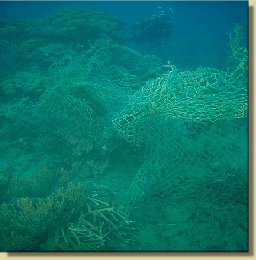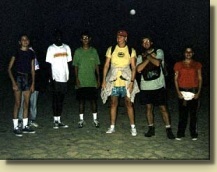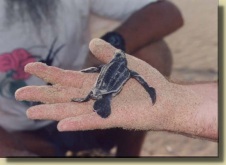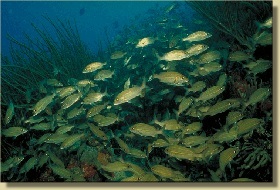Participants solidify and share the knowledge they
have gained as they prepare and present a slide presentation for their
community and peers at other schools.
 |
Participants observe and learn about
pillar coral (Dendrogyra cylindrus). This is one of the few stony
corals whose polyps (individual coral animals) can be observed extended
during the day. |
The long-term goal of this course is to create educated and
pro-active members of island and coastal communities empowered with the
knowledge and commitment needed to conserve and protect valuable coastal
ecosystems for their and future generations.
|
Southern stingray rises from
feeding on the bottom before an underwater Caribbean sunset. One
of the many reef creatures Youth Corps participants will get to
observe. |
The course materials and activities are designed to convey the economic
importance of coral reefs, the human behaviors currently threatening this
critical ecosystem, and coral reef conservation/restoration solutions that can
be initiated by local island and coastal communities.
| Discarded fishing net strangles coral reef.
Participants will learn about and see many of the man-made threats to
this ecosystem. |
 |
This annual program involves a commitment to 19 Saturday
sessions, from the hours of 8:00 am until 3:00 pm. A nighttime trip to the
bioluminescent bay on Culebra is planned for Saturday, March 9th. Four
weekdays during summer break are scheduled for night patrol and documentation
of Culebra's Giant Leatherback Sea Turtle nesting beaches. (See Course
Syllabus.)
Some Saturday classes will be shorter depending on weather or on
the amount of material to cover. No activities are scheduled for the
months of December or July to accommodate family vacations. Twenty-four
(24) total sessions are scheduled for the year.
 |
Tired Youth Corps students nearing the end of an all
night sea turtle watch - Playa Brava, Culebra, Puerto Rico. |
| Giant Leatherback (Dermochelys coriacea) sea turtle
hatchling - Playa Brava, Culebra, Puerto Rico. |
 |
Awards and gift certificates will be given to those students
successfully completing the course. Students cannot miss more than three
sessions to successfully complete the course.
There is no cost to participants, however kids are encouraged to
provide their own masks, fins, and snorkels. This equipment should be
purchased after the student is familiar with how to select proper fitting gear.
CORALations will also supply snorkel equipment, wet suits and life jackets.
|

|
|
Visiting Culebra's coral reefs.
|
Participating students and parents will be required to read and
sign liability release forms.
If there are more than 15 applicants interested in
participating, older students will be given priority, as the younger students will have the opportunity to
participate the following year.
All course materials and instruction will be given in Spanish
with English translation provided.
Local teachers are cordially invited to participate.
An orientation will be held December 1, 2001, at the Culebra Public Library. Interested students should bring parent or guardian to
this meeting.
Funding for CORALations' Conservation Youth Corps 2002 is
provided by these generous sponsors.
Home | About
CORALations | Information About Coral Reefs | Reef
Visitor Information
Conservation Youth Corps | Educational
Materials | REEF BALL™ Artificial Reefs
Creature Feature | Memberships
Contact Us